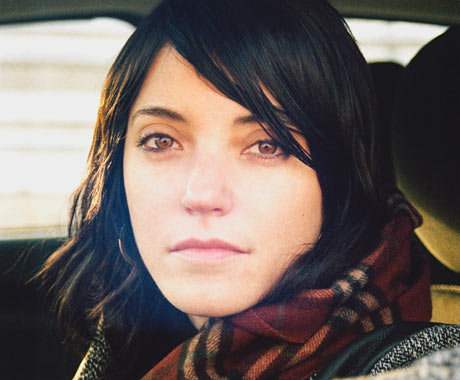"It kept coming back to the National and everyone who played on the record," Sharon Van Etten sighs. She's referring to 2012's Tramp, her third album, as well as the success that surrounded it. Van Etten toured for two years off Tramp, garnering the most attention the songwriter had ever received since she began in 2009. But not all of that attention turned out exactly how she thought it would.
That record, of course, was produced by the National's Aaron Dessner and featured members of Beirut and Wye Oak. "It messed with my experience of it," Van Etten shares. "I ended up feeling insecure and it was all on me, it was nobody's fault." Once the tour bus halted, she was left with mixed emotions. Van Etten questioned her songwriting, fearing that eyes were only on her because of her accomplices, not because of the poignant virility in her pensive songs. She couldn't do an interview without those names being brought up, but this time around, it was Van Etten who cites Dessner's name first.
"I learned a lot from him," she continues. "I applied that to this record, so I wouldn't take back that experience at all."
Her latest record, Are We There, is the product of Van Etten's learning; an earnest diary entry of recent events regarding change, balance and a subsequent breakup. It also marked a shift, from guitar-heavy gloom to keyboard and organ-centric melancholy. "Break my legs so I won't run to you," she cries on "Your Love Is Killing Me," just one of many shattering moments of truth for Van Etten.
Because Van Etten has had less time to reflect on these recent cluster of emotions — her first three albums cogitate over old relationships with a healthy breadth of time to stew over lyrics — Are We There is, as she describes it, her at her rawest. "This one's much more introspective and current," she admits. "I feel like, because of that, it's so fresh and it's probably the most honest since I haven't the perspective or the hindsight to really process everything that's happened; it's the heaviest record that I've written."
Although the album leaves Van Etten still in search for a balance in life (she speaks of her upcoming tour and her sister's wedding with the same sense of urgency and excitement), the album presents a poise in production. Having employed a set of skills from Dessner, Van Etten self-produced Are We There and it's there that she speaks with a sense of aplomb and certainty.
"It was a really, really positive experience for me," she happily affirms. "The people on the record were mostly my band and we had been touring together for over two years so we were really comfortable with each other. I just know myself better now and I'm a lot more secure in who I am."
That record, of course, was produced by the National's Aaron Dessner and featured members of Beirut and Wye Oak. "It messed with my experience of it," Van Etten shares. "I ended up feeling insecure and it was all on me, it was nobody's fault." Once the tour bus halted, she was left with mixed emotions. Van Etten questioned her songwriting, fearing that eyes were only on her because of her accomplices, not because of the poignant virility in her pensive songs. She couldn't do an interview without those names being brought up, but this time around, it was Van Etten who cites Dessner's name first.
"I learned a lot from him," she continues. "I applied that to this record, so I wouldn't take back that experience at all."
Her latest record, Are We There, is the product of Van Etten's learning; an earnest diary entry of recent events regarding change, balance and a subsequent breakup. It also marked a shift, from guitar-heavy gloom to keyboard and organ-centric melancholy. "Break my legs so I won't run to you," she cries on "Your Love Is Killing Me," just one of many shattering moments of truth for Van Etten.
Because Van Etten has had less time to reflect on these recent cluster of emotions — her first three albums cogitate over old relationships with a healthy breadth of time to stew over lyrics — Are We There is, as she describes it, her at her rawest. "This one's much more introspective and current," she admits. "I feel like, because of that, it's so fresh and it's probably the most honest since I haven't the perspective or the hindsight to really process everything that's happened; it's the heaviest record that I've written."
Although the album leaves Van Etten still in search for a balance in life (she speaks of her upcoming tour and her sister's wedding with the same sense of urgency and excitement), the album presents a poise in production. Having employed a set of skills from Dessner, Van Etten self-produced Are We There and it's there that she speaks with a sense of aplomb and certainty.
"It was a really, really positive experience for me," she happily affirms. "The people on the record were mostly my band and we had been touring together for over two years so we were really comfortable with each other. I just know myself better now and I'm a lot more secure in who I am."
